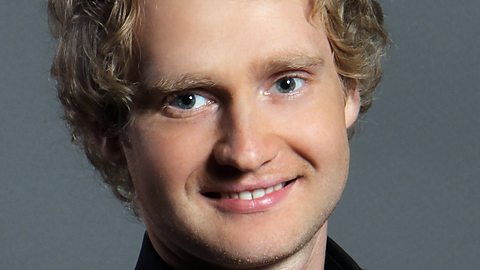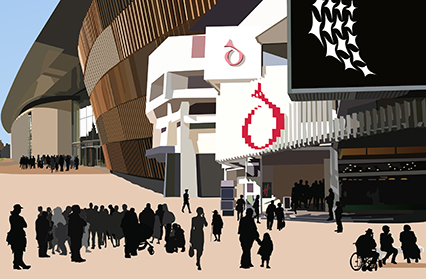Last night, June 15, saw the Main Prize Concert 1 of the BBC Cardiff Singer of the World at St David’s Hall, from which a winner was chosen to go ahead to Sunday’s final. Nigel Jarrett was there for Wales Arts Review.
Singing competitions have a pedigree stretching beyond any late and cynical observation that comparisons in musical performance are unrealistic, if not odious. But jousts of the kind embodied in the BBC Cardiff Singer of the World, which pit one kind of musician against another in items of their own choosing, tend to blur with individual multiplicity. In Cardiff the platform can be awash with the blood from dismembered gobbets of opera as a motley succession of singers in suits or frocks designed to catch the eye of those interested in one of the contest’s more fatuous aspects extend the parade.
Even in its early manifestation as Cardiff Singer of the World (broadcast by the BBC before ‘Aunty’ played a bigger part in its ownership, and realised its international dimension as both commercial and musical spectacle), the suggestion that it was really an exercise to find the next generation of opera singers was bolstered by the presence of foreign (and British) house CEOs, or their envoys, with contracts in their pockets. It’s easier when all the candidates are in one place for a week, despite the global audition process that got them there. Well, what did anyone expect? There’s oratorio, there are Lieder, songs-with-orchestra and there’s opera, and the greatest of these is opera. Who would dispute that?
Well, high-flying bass Jongmin Park might. Although illustrating the fact that the contestants are already embarked on careers, some of meteoric trajectory – he’s sung Colline (La bohème) for the Royal Opera and appeared at the BBC Proms – Park opened his account at the Main Prize Concert 1 with ‘Nun scheint in vollem Glanze der Himmel’, the great prelude to the creation of Man episode from Haydn’s oratorio Die Schöpfung (The Creation). It was a fine delivery but so was his ‘Studia il passo…Come dal ciel precipita’, the recitative and aria from Verdi’s Macbeth in which Banco (Banquo), addresses first his son and then the absent Duncan, wishing he could suppress thoughts of the foul deed by which Macbeth has become king.
Delivery, however poised, needs more expression (the thing delivered) and Ingeborg Gillebo had that in abundance, getting to the heart of the mocking anger of trouser-role Stéphano’s ‘Que fais-tu, blanche tourterelle?’ from Gounod’s Roméo et Juliette and pursuing this plucky distaff spirit in ‘Ah, scostati!… Smanie implacabile’, Dorabella’s overwrought despair at the departure of hers and Fiordiligi’s menfolk in Mozart’s Così fan tutte. But we had to wait awhile for a darker and thus more powerful mezzo voice.
Meanwhile, Sebastian Pilgrim, a flexible and lyrical bass at ease up and down the ladder and with a physical presence to match, proved to be a true contender, opening with one of the great bass arias in ‘Ella giammai m’amo!… Dormiro sol nel manto mio regal’, from Verdi’s Don Carlo, in which an embattled King Philip reflects on the wisdom of his decision to marry a younger woman. It got better with Hagen’s ‘Hier sitz ich zur Wacht’ from Wagner’s Götterdämmerung. Here was a singer assured of work in at least one specialised corner of the repertory, given time; in Wagner, where pressure on the voice is crucial, it’s of the essence.
The richer, deep-digging mezzo belonged to Marina Pinchuk, who deployed it to effect in ‘Acerba voluttà’, Princess de Bouillon’s take on clandestine goings-on with former lover Maurizio in act two of Cilea’s Adriana Lecouvreur. In a set with a few minor problems of intonation, she rose to the ecstatic challenge of ‘Mon coeur s’ouvre à ta voix’, Delila’s ulterior response to Samson’s admission of love in Samson et Delila by Saint-Saëns. Here was where competitions of this sort deprive us of musical sense and completion, for in real life this aria is later joined by Samson to create a duet.

We thought we might already have heard the winner of this first round. But these things are never over till the tenor sings. Sad, perhaps, but true. However, Oleksiy Palchykov conveyed both vulnerability and strength of character – difficult to do in a penguin suit – with some of the most heartfelt, focused and earnestly projected singing of the night. Take your pick, but Pylades’s ‘Quel langage accablant…Unis dès la plus tendre enfance’ from Gluck’s Iphigénie en Tauride, a hymn to devotion unto death, and ‘Amici miei, dopo eccessi…Il mio tesoro’, Don Ottavio’s pledge that Donna Anna will get her revenge on the murderous and eponymous Don Giovanni in Mozart’s opera, was like someone frolicking in an orchard of eternally abundant fruit.
That’s the thing about tenors: they’ve plenty of ripe stuff to choose from, unlike a bass. The chairman of the jury, David Pountney, announcing Palchykov as the winner, said the Ukrainian triumphed with elegance, charm, and a perfectly chosen programme.
And there you have it. It’s what you sing as much as the way you sing it. For the record, musical highlights were widely spread and included Park’s ‘Gremin’s Aria’ from Tchaikovsky’s Eugene Onegin; Gillebo’s ‘Flickan kom ifran sin alsklings mote’, from Sibelius’s Five Songs Op 37; Pilgrim’s ‘Mein Herr un Gott, nun ruf’ich dich’ from Wagner’s Lohengrin; Pinchuk’s ‘Marfa’s Aria’ from Mussorgsky’s Khovanshchina; and just about anything else by Palchykov on top of the aforementioned.
Palchykov, who was presented with his trophy by the competition’s patron, Dame Kiri Te Kanawa, will go through to the final, as will all other winners of this week’s heats. The finals will also include a ‘wild card’ competitor.
BBC Cardiff Singer of the World Main Prize Concert 1
Jongmin Park (bass), aged 28, South Korea.
Ingeborg Gillebo (mezzo), aged 32, Norway.
Sebastian Pilgrim (bass), aged 30, Germany.
Marina Pinchuk (mezzo), aged 32, Belarus.
Oleksiy Palchykov (tenor), aged 29, Ukraine.
BBC National Orchestra of Wales, conducted by Thomas Søndergård.



 Enjoyed this article? Support our writers directly by buying them a coffee and clicking this link.
Enjoyed this article? Support our writers directly by buying them a coffee and clicking this link.







